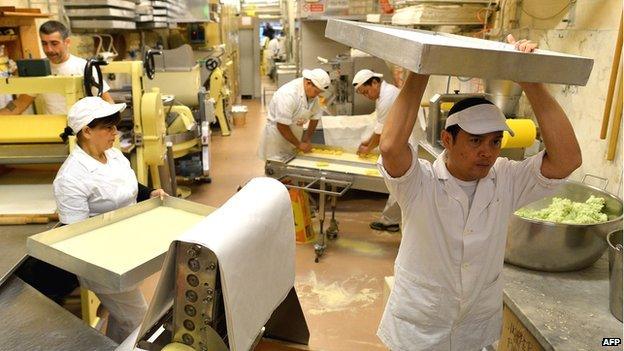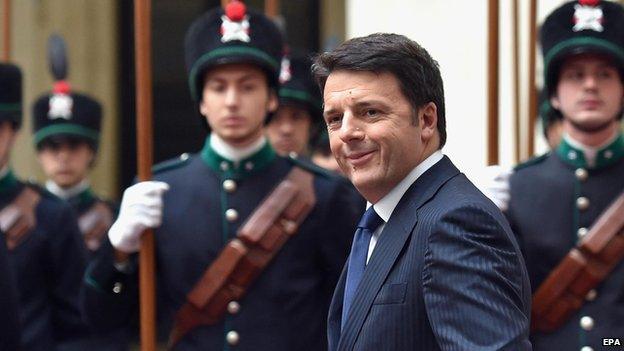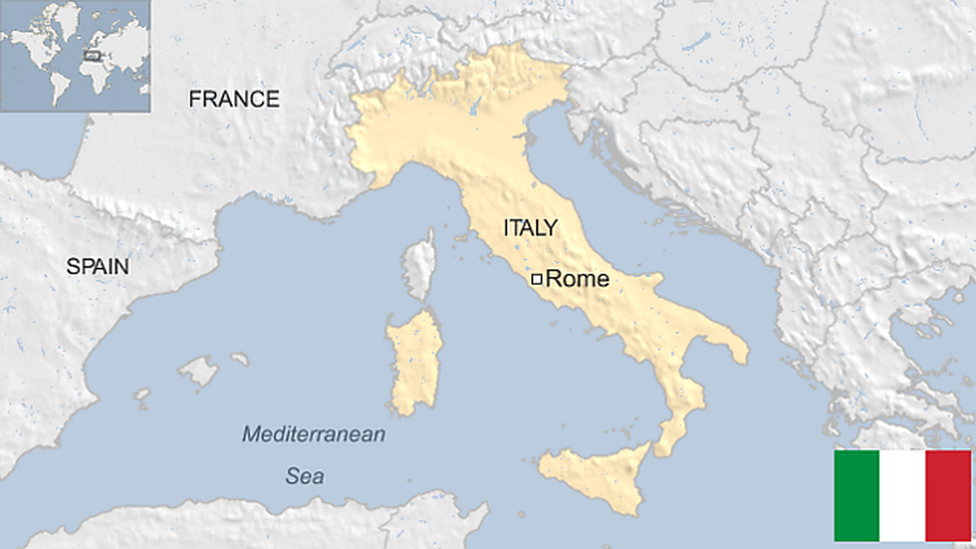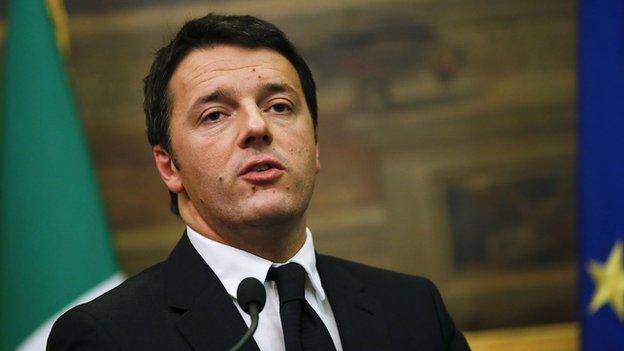Italy's PM Matteo Renzi in fight against job barriers
- Published

Pasta makers in Rome: The government wants more flexibility in the labour market
It is quite unusual for an entire country to be able to quote the exact number of a particular subsection of its employment laws.
But the future of Italy's economy and perhaps its government comes down to a debate over Article 18 of the 1970 Employment Law.
Italy's main trade unions have called out their members on general strike in order to protect this article. It essentially protects workers in medium-sized and large firms from being fired. Critics argue that it makes businesses hesitate to hire new workers - for fear of never being able to get rid of them.
As a result, this creates a two-tier job market - a top tier for mostly older workers who have permanent jobs from which they cannot be fired, and a second tier for mostly younger workers who have to survive on unofficial, short-term contracts. Some don't even manage that. Among 15 to 25-year-olds the unemployment rate is 43%.
"It is unthinkable that someone like me is impossible to fire and someone who is 30 has no guarantees," says 46-year-old Prof Giovanni Orsina, from Rome's LUISS University. "To start to build a model that makes it possible to live with flexibility, a regulated flexibility, is sacrosanct."
Economists argue that Italy's rigid labour laws stop the country's economy from growing. Italy's economy is currently in recession. Over the past year, its GDP has fallen by 0.4%. In the decade to 2010, only two countries had lower GDP growth than Italy's - Haiti and Zimbabwe.

Police clashed with opponents of the Jobs Act in Rome on 3 December
International pressure
In recent years, a series of Italian governments has tried to reform or bypass Article 18, without lasting success. Prime Minister Matteo Renzi took office in February 2014 with a promise to create a single-tiered, more fluid job market.
His centrepiece Jobs Act was recently approved by parliament. (The Act is known in Italy by its English-language term - in an attempt to sound dynamic and to echo President Barack Obama's own 2011 American Jobs Act.) But details of its implementation have yet to be agreed.
The International Monetary Fund and European Union both support attempts to change the country's labour laws. The EU is also insistent that Italy stick to the eurozone's strict rule - budget deficits cannot exceed 3%. Mr Renzi has criticised this rule, but says that he will abide by it.
His tougher problem lies with Italy's trade unions. They believe that the existing labour laws protect workers who could otherwise be fired by unscrupulous firms. That is why they have called their strike.

Prime Minister Matteo Renzi is trying to tackle high youth unemployment and feeble output
No quick fix
"Italians continue to think that providence will come and solve their problems," says Prof Orsina.
"There is a huge pressure, a typical Italian mechanism, linked to thinking that problems can be solved quickly. And Renzi offered that picture - having arrived without the legitimacy of an election - saying 'I'm here because I'm a problem-solver'. He offered to solve things quickly. But this is a promise that can't be kept. The problems are dense and profound."
There is much that Italy seeks to preserve. The country has an incredibly well-supported, healthy, early-retiring, long-living population. Its members of parliament earn more than any of their EU counterparts. State officials have thousands of chauffeur-driven cars to drive them to work.
But the country's official lifestyle comes at a cost. Its youngest and most educated citizens cannot find work. In 2013, 82,000 Italians emigrated - the highest number for 10 years.
The prime minister hopes that his Jobs Act will persuade them to return.
- Published8 December 2014

- Published21 October 2014
- Published4 October 2023

- Published25 February 2014
